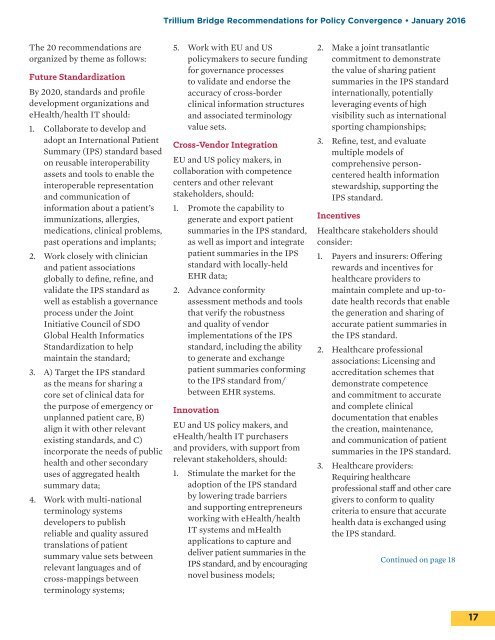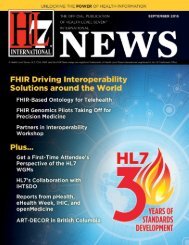In this Issue HL7 News
1JHV2Su
1JHV2Su
You also want an ePaper? Increase the reach of your titles
YUMPU automatically turns print PDFs into web optimized ePapers that Google loves.
Trillium Bridge Recommendations for Policy Convergence • January 2016<br />
The 20 recommendations are<br />
organized by theme as follows:<br />
Future Standardization<br />
By 2020, standards and profile<br />
development organizations and<br />
eHealth/health IT should:<br />
1. Collaborate to develop and<br />
adopt an <strong>In</strong>ternational Patient<br />
Summary (IPS) standard based<br />
on reusable interoperability<br />
assets and tools to enable the<br />
interoperable representation<br />
and communication of<br />
information about a patient’s<br />
immunizations, allergies,<br />
medications, clinical problems,<br />
past operations and implants;<br />
2. Work closely with clinician<br />
and patient associations<br />
globally to define, refine, and<br />
validate the IPS standard as<br />
well as establish a governance<br />
process under the Joint<br />
<strong>In</strong>itiative Council of SDO<br />
Global Health <strong>In</strong>formatics<br />
Standardization to help<br />
maintain the standard;<br />
3. A) Target the IPS standard<br />
as the means for sharing a<br />
core set of clinical data for<br />
the purpose of emergency or<br />
unplanned patient care, B)<br />
align it with other relevant<br />
existing standards, and C)<br />
incorporate the needs of public<br />
health and other secondary<br />
uses of aggregated health<br />
summary data;<br />
4. Work with multi-national<br />
terminology systems<br />
developers to publish<br />
reliable and quality assured<br />
translations of patient<br />
summary value sets between<br />
relevant languages and of<br />
cross-mappings between<br />
terminology systems;<br />
5. Work with EU and US<br />
policymakers to secure funding<br />
for governance processes<br />
to validate and endorse the<br />
accuracy of cross-border<br />
clinical information structures<br />
and associated terminology<br />
value sets.<br />
Cross-Vendor <strong>In</strong>tegration<br />
EU and US policy makers, in<br />
collaboration with competence<br />
centers and other relevant<br />
stakeholders, should:<br />
1. Promote the capability to<br />
generate and export patient<br />
summaries in the IPS standard,<br />
as well as import and integrate<br />
patient summaries in the IPS<br />
standard with locally-held<br />
EHR data;<br />
2. Advance conformity<br />
assessment methods and tools<br />
that verify the robustness<br />
and quality of vendor<br />
implementations of the IPS<br />
standard, including the ability<br />
to generate and exchange<br />
patient summaries conforming<br />
to the IPS standard from/<br />
between EHR systems.<br />
<strong>In</strong>novation<br />
EU and US policy makers, and<br />
eHealth/health IT purchasers<br />
and providers, with support from<br />
relevant stakeholders, should:<br />
1. Stimulate the market for the<br />
adoption of the IPS standard<br />
by lowering trade barriers<br />
and supporting entrepreneurs<br />
working with eHealth/health<br />
IT systems and mHealth<br />
applications to capture and<br />
deliver patient summaries in the<br />
IPS standard, and by encouraging<br />
novel business models;<br />
2. Make a joint transatlantic<br />
commitment to demonstrate<br />
the value of sharing patient<br />
summaries in the IPS standard<br />
internationally, potentially<br />
leveraging events of high<br />
visibility such as international<br />
sporting championships;<br />
3. Refine, test, and evaluate<br />
multiple models of<br />
comprehensive personcentered<br />
health information<br />
stewardship, supporting the<br />
IPS standard.<br />
<strong>In</strong>centives<br />
Healthcare stakeholders should<br />
consider:<br />
1. Payers and insurers: Offering<br />
rewards and incentives for<br />
healthcare providers to<br />
maintain complete and up-todate<br />
health records that enable<br />
the generation and sharing of<br />
accurate patient summaries in<br />
the IPS standard.<br />
2. Healthcare professional<br />
associations: Licensing and<br />
accreditation schemes that<br />
demonstrate competence<br />
and commitment to accurate<br />
and complete clinical<br />
documentation that enables<br />
the creation, maintenance,<br />
and communication of patient<br />
summaries in the IPS standard.<br />
3. Healthcare providers:<br />
Requiring healthcare<br />
professional staff and other care<br />
givers to conform to quality<br />
criteria to ensure that accurate<br />
health data is exchanged using<br />
the IPS standard.<br />
Continued on page 18<br />
17



